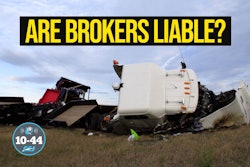Many ISO 9000-certified companies prominently display their certification and registrar logo on their websites. Canton, Mich.-based A.D. Transport Express, which completed the transition to 2000 standards about two years ago, displays its entire certificate on its website.
About five years ago, Express-1 faced a choice: spend thousands of dollars to obtain IS0 9000 quality certification or potentially lose key customers in the automotive industry. ISO 9000 is a series of quality management system standards designed to ensure consistency of a product or service. ISO 9000 standards were first released in 1987 by the Geneva, Switzerland-based International Organization for Standardization, also known as ISO. They became popular among U.S. manufacturers in the late 1990s, especially in the automotive industry. And suppliers to the automotive industry, including hundreds of transportation providers, were pushed to obtain certification.
Express-1, a Buchanan, Mich.-based expedited transporter, didn’t hesitate. It coughed up the money needed to have consultants help design a program, to buy an off-the-shelf software system and have a registrar conduct an audit. Express-1 got its certification and kept the business.
For several years, ISO 9000 certification meant little more to Express-1 management than a prerequisite for doing business with important customers, says Jeff Curry, chief operating officer of the carrier, which today operates about 160 trucks from cargo vans through Class 8 tractors. Certification and the process leading to it hadn’t really changed how management conducted business.
But something interesting happened. In late 2000, the ISO 9000 standards were updated for the first time in six years, and companies that were certified to the 1994 standards were given three years to certify to the new standards. As Express-1 began the process of changing its quality systems to the 2000 standards, it learned to embrace them.
As Curry puts it, Express-1’s management has now taken ownership of its quality certification. “We have developed a new tool,” he says. “On a weekly basis, we analyze our customers’ concerns as well as compliments.” In sales calls, Express-1 managers now talk about how the company does business, demonstrating how its procedures are designed to ensure customer satisfaction.
As Express-1 converts to the new standards – it will be certified before the Dec. 31 deadline – the recertification process has encouraged a new attitude. “ISO 9000 has put us in this mindset of internal review,” Curry says. It allows the company to judge itself – and its customers – more objectively.
The demand of a customer or group of customers may be the most compelling reason to consider ISO 9000 certification, but it isn’t the only one. With their principal focus on consistency, ISO 9000 standards can help tighten procedures in an operation that has become too loose. And even if an existing customer doesn’t demand certification, it can be a point of differentiation in sales and marketing when other factors are largely equal. Whether these benefits are worth the investment of significant time and money is up to you.
A welcome revision
Express-1 and many other service providers were put off by the 1994 standards because they seemed to be written to apply mostly to design and manufacturing enterprises. “It was like trying to fit a square peg into a round hole,” Curry says.
According to ISO, many ISO 9000 users and customers urged some significant changes in the 2000 update. The objectives that drove the revisions, ISO says, include applicability to all product categories, including services, and all sizes of organizations; simple, clear language; and greater orientation toward continual improvement and customer satisfaction.
The 1994 standards and language used in them were heavily focused on documentation and testing. The apparent product bias made ISO 9000 challenging for transportation companies. “What’s inspection and testing to a service provider?,” asks Mike Lavallee, president of Milford, N.H.-based Tech Transport, a third-party logistics provider and broker.
Still, Lavallee saw value in obtaining certification and did so about five years ago. He too prefers the ISO 9001: 2000 standards, to which Tech Transport already has been certified.
The focus of the 2000 standards are more “big picture.” According to ISO, the new standards are based on eight quality management principles:
· Customer focus;
· Leadership;
· Involvement of people;
· Process approach;
· System approach to management;
· Continual improvement;
· Factual approach to decisionmaking; and
· Mutually beneficial supplier relationships.
Customer focus
“ISO 9000 is a lot more customer focused now,” Curry says. For example, within the principle of customer focus, companies that are certified to ISO 9001:2000 standards must survey their customers periodically. Many of the metrics companies develop as part of the certification process are aimed at delivering a consistent product or service to customers. In the context of transportation, that might be on-time delivery or no damage claims.
Curry appreciates that the new standards have been simplified and that the documentation requirements appear to have been rationalized. “It seems like electronic administration of the process is more acceptable,” he says. “The old process was very paper-oriented.”
And Curry supports the emphasis on leadership and systematic approaches to management. “The new standards force our company to monitor for effectiveness, which we weren’t doing before.”
“The new standards are very customer satisfaction oriented,” says Lavallee. That was supposed to be have been the goal of the old standard, but it wasn’t focused, he says. Now there is more emphasis on measuring improvements, customer satisfaction and other goals systematically.
At Langham, an Indianapolis-based company providing transportation, logistics and warehousing that received ISO 9000 certification in 1998, customers are the focus of four of the company’s five quality objectives, says Kelli Smith, who heads up marketing and business
One of the most comprehensive sources of auditors and registrars is the Registrar Accreditation Board’s website, which provides searchable databases.
development. The five objectives are on-time delivery, accuracy in distribution, customer satisfaction, employee satisfaction and zero loss or damage. Each is measured in some tangible way. Customer and employee satisfaction, for example, are measured with periodic surveys, among other tools.
“Service is subjective, so we are constantly challenged to go back to our quality system,” Smith says. The company measures how quickly it is invoicing and how promptly it is confirming delivery. Tracking service failures and documenting them becomes very important when you are dealing with almost 800 carriers, Smith says.
Management discipline
While Express-1 pursued ISO 9000 certification in response to customer ultimatums, Tech Transport didn’t face that pressure. For Lavallee, it was the potential for internal improvements that was most attractive.
“The reason we got involved was that we were a small entrepreneurial business,” Lavallee says. “Those companies generally don’t have a discipline.”
Tech Transport, employs seven people in its operations department. Lavallee believes that it is essential that all seven people operate in the same manner and use the same principals for making decisions. ISO 9000 standards encourage that discipline, he says.
The value of a defined process is substantial, even for the most basic and routine decisions, Lavallee believes. He uses the simple example of placing a load with a carrier. Without a process or checklist, it would be easy to book a load of produce, for example, without remembering to ask the truck operator whether he had a reefer.
If your principal goal is internal improvement, the real value of ISO 9000 standards are in the process leading up to certification – not in certification itself. Intially, it took Tech Transport about a year to map all its processes and modify them to comply.
“We had to write down how we did everything,” Lavallee says. “It starts with sales giving a quote and how you document that.” In the past, documentation hadn’t been the highest priority. “Probably our record keeping was a little flaky.” Now, Tech Transport has a process for ensuring everything is done appropriately – from getting customer approval for lumper charges to making sure all required documentation on a new carrier is on file before a truck is dispatched.
“It has improved our training tremendously,” Lavallee says. “People have to be trained. You can’t just stick a kid in a job and say, ‘go do it.'”
Market differentiation
Although it wasn’t his principal motivation, Lavallee certainly recognizes the importance of ISO 9000’s sales and marketing benefits to the overall value proposition. Manufacturers that have quality certifications like ISO 9000, QS 9000 (the automotive industry’s version of ISO 9000) or Six Sigma, want to do business with certified suppliers, Lavallee says. “If I have a competitor at the same price, and I’m ISO certified and he’s not, then it’s more likely that I will get the business.”
Certification is particularly valuable for brokers wanting to instill confidence in their services, Lavallee says. “Tech Transport started after deregulation. Brokers didn’t have the best reputation and still do not.” ISO 9000 certification gives the company an extra measure of credibility when it finds a prospect who is predisposed not to like brokers.
ISO 9000 certification isn’t cheap, and the process requires commitment of time and resources. But if your perception of ISO 9000 is based on the conventional wisdom that it’s for manufacturers, look again. Consider whether the streamlined 2000 standards make ISO 9000 certification a good choice for your operation.
Getting started in ISO
Although the revisions to ISO 9000 standards in 2000 may make them more approachable and easier to grasp, the process of obtaining certification is no simple matter. It’s common for the process to take a year or even more, and there’s an ongoing commitment to maintain certified processes and have them audited periodically.
In theory, a company can do all the work needed to obtain certification on its own without consultants. You can, for example, purchase the standards through the International Organization for Standardization (ISO) website (www.iso.org) or the website (www.ansi.org) of the American National Standards Institute, a non-profit organization that administers the standards in the United States. The ISO website offers a wealth of resources on how ISO 9000 works and how to implement it. In addition to the standards, ISO offers other resources, such as a handbook for small businesses.
Local institutions may offer resources as well. After Tech Transport decided to investigate certification, President Mike Lavallee and two other managers took a course offered by a local college on how to obtain ISO 9000 certification. Eventually, Tech Transport hired the instructor as a consultant.
A consultant might be an unattractive expense, but it could be a wise investment. That’s because once you believe you are ready to go, a registrar must come in to certify your company. If you haven’t done a good job reviewing and modifying your processes, you will need to pay the registrar fee again. Once you are certified, the registrar returns periodically to ensure that you continue to follow your certified process.
Referrals from other transportation companies are a good source of third-party auditors, who can work as consultants, as well as registrars. Tech Transport found its registrar by contacting a key customer, who was pleased with the way the registrar conducted audits.
Another good source of leads on auditors/consultants as well as registrars is the Registrar Accreditation Board, which provides accreditation services for registrars and auditors. RAB’s website (www.rabnet.com) offers searchable directories of auditors and registrars. The auditor database, for example, lets you search accredited auditors not only by location but by field of experience, such as transport services.






